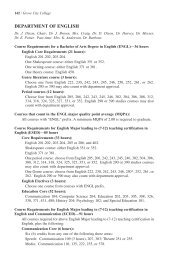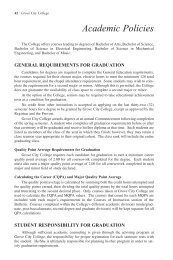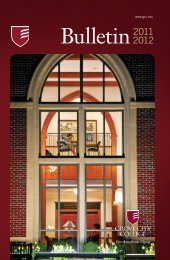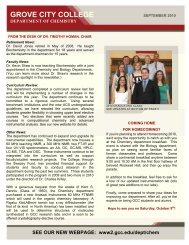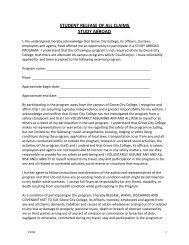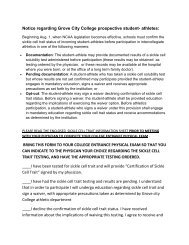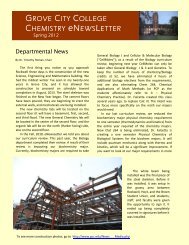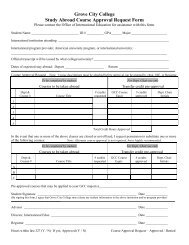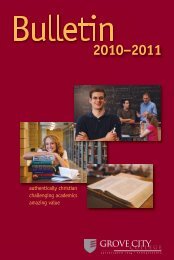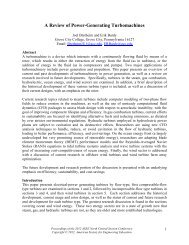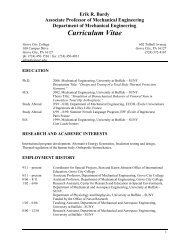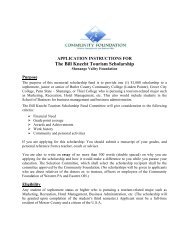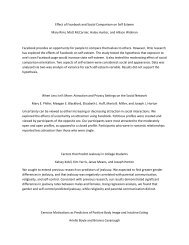2009–2010 - Grove City College
2009–2010 - Grove City College
2009–2010 - Grove City College
You also want an ePaper? Increase the reach of your titles
YUMPU automatically turns print PDFs into web optimized ePapers that Google loves.
192 / <strong>Grove</strong> <strong>City</strong> <strong>College</strong><br />
Physics 303, 305, 310, 431 or 442 (Electrical Engineering majors may not take<br />
Physics 305).<br />
Course Requirements for a minor in Astronomy (24 hours)<br />
Physics 101 or 121 (4 hours).<br />
Physics 102 or 122 (4 hours).<br />
Astronomy 206, 207, 301, 310 and 311 (16 hours).<br />
Training in both oral and written communication skills is an oft-neglected part of the<br />
undergraduate science curriculum. At the same time, communicating one’s ideas and results<br />
in a clear and coherent manner is an essential skill for a scientist, requiring clarity of thought<br />
and expression. In addition, a scientist must know how to find, analyze, and use information<br />
developed by others in their field. To address these concerns, all physics majors are<br />
required to take Physics 288 as a Writing Intensive (WI) course and Physics 321 as a<br />
Speaking Intensive (SI) and Information Literacy (IL) course. In tandem, these courses provide<br />
focused, discipline specific training in the areas of oral and written communications as<br />
well as the ability to gather, analyze and use information within the field of physics.<br />
Students are expected to contact their advisors for a detailed schedule of courses recommended<br />
to meet requirements for a major.<br />
PHYSICS (PHYS)<br />
PHYS 101. GENERAL PHYSICS I-ENGINEERING. A calculus-based study of mechanics including<br />
kinematics, Newton’s laws of motion, work, energy, momentum, equilibrium, angular motion, fluids,<br />
oscillations, and gravity. Three lectures and one workshop per week. Students may not receive credit<br />
for both Physics 101 and 121. Corequisite: Mathematics 161. Fall semester only, four hours.<br />
PHYS 102. GENERAL PHYSICS II – ENGINEERING. A survey of the fundamental principles<br />
of electricity, magnetism, Maxwell’s equations, and circuit theory. Three lectures and one workshop<br />
per week. Prerequisite: Physics 101. Corequisite: Mathematics 162.<br />
Spring semester only, four hours.<br />
PHYS 121. COLLEGE PHYSICS I. A study of mechanics at the pre-calculus level with applications<br />
to the life sciences. Topics include kinematics, Newton’s laws, work, energy, momentum, angular<br />
motion, fluids, oscillations, and gravity. Three lectures and one workshop per week. Students may<br />
not receive credit for both Physics 101 and 121. Fall semester only, four hours.<br />
PHYS 122. COLLEGE PHYSICS II. A study of electricity, magnetism, and modern physics at the<br />
pre-calculus level with applications to the life sciences. Topics include electric field and potential, DC<br />
circuits, magnetism, induction, geometric and physical optics, relativity, and nuclear physics. Three<br />
lectures and one workshop per week. Prerequisite: Physics 121. Spring semester only, four hours.<br />
PHYS 135. HORIZONS IN PHYSICS. Discussion of current topics in physics. Since scientific<br />
journals will provide much of the content for this course, students will learn how to acquire and interpret<br />
articles from scholarly publications. In addition, students will be required to attend presentations<br />
by physicists actively engaged in research, as well as field trips to academic and industrial laboratories<br />
in the area. This course is open to all students but, in the event that the class becomes full, preference<br />
is given to physics majors. Fall semester only, one hour.<br />
PHYS 210. ELECTRONICS. An introduction to electronics emphasizing those topics most useful to<br />
the experimental physicist. As such, the physics of active and passive devices (resistors, capacitors,<br />
inductors, diodes, transistors, sensors, etc.) will be discussed along with practical circuit applications<br />
(filters, operational amplifiers, voltage regulators, oscillators, timers, etc.). The bulk of this course is<br />
devoted to analog electronics but digital electronics is discussed briefly at the end of the semester.<br />
Three hours of lecture and three hours of lab per week. Prerequisite: Physics 102.<br />
Fall semester only, four hours.



